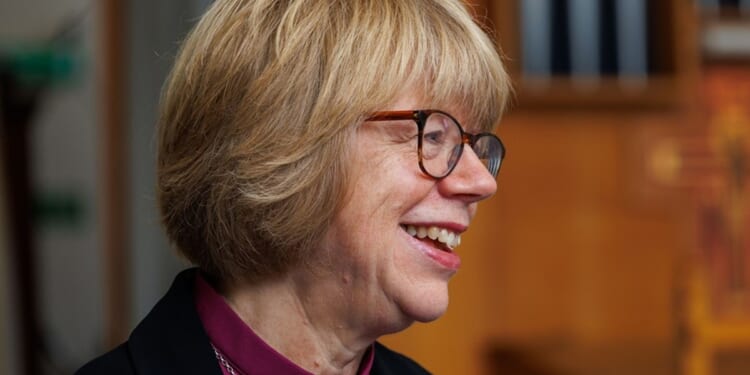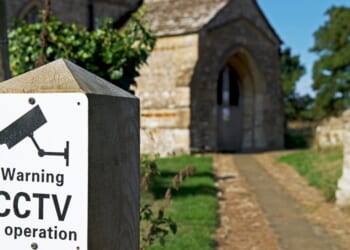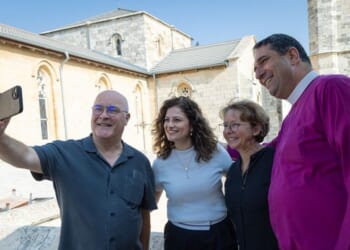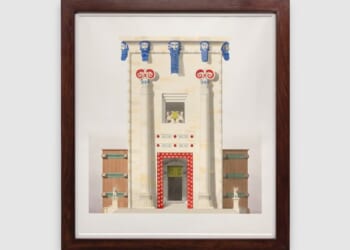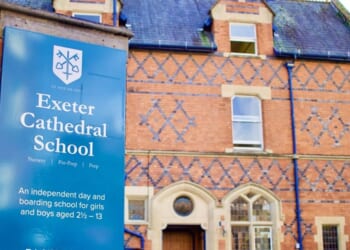CHURCH and political leaders across the UK were among the first to welcome the news that the Bishop of London, the Rt Revd Sarah Mullally, has been nominated as the next Archbishop of Canterbury.
The news was announced by Downing Street at 10 a.m. on Friday.
The Prime Minister said: “The Church of England is of profound importance to this country. Its churches, cathedrals, schools, and charities are part of the fabric of our communities. The Archbishop of Canterbury will play a key role in our national life. I wish her every success and look forward to working together.”
Her nomination — agreed by at least a two-thirds majority of the 17 voting members of the Canterbury Crown Nominations Commission (CNC) — was approved by the King.
A spokesperson for the Palace said: “The King approved the prime minister’s recommendation on 29 September. His Majesty congratulates Bishop Sarah on her appointment as archbishop-designate, a role which is of such importance in the UK and across the global Anglican Communion.”
Lord Evans of Weardale, who chaired the CNC, said that it had been a “privilege” to lead the process of discernment, which “began with the public consultation, which heard the voices of thousands of people as they expressed their hopes for this nomination, and continued all the way through to the Commission’s final meeting” a week ago.
He thanked all involved, especially those who had responded to the consultation, and the Commission members “who worked so diligently over several months, ably assisted by the Appointments Secretaries and by the Appointments and Vocations team at Lambeth Palace. I shall be praying for Bishop Sarah as she prepares to take up this new ministry in the coming months.”
The Archbishop of York, with whom Bishop Mullally will work closely, described her as “a person of huge courage, wisdom, integrity and experience. In the many challenges the Church of England faces at the moment we need the kind, godly and stable leadership Bishop Sarah will bring. It will be my great pleasure to serve alongside her.”
Among the diocesan bishops to welcome the news was the Bishop of Chelmsford, Dr Guli Francis-Dehqani, who, it had been suggested in the media, had been shortlisted.
She said: “I know her as a colleague and a friend in the House of Bishops and have seen first-hand the many gifts she will bring to the Church and the communities and people we serve, across our nation and the Anglican Communion.
“This is also a hugely significant moment, because Bishop Sarah will be the first woman to serve as Archbishop of Canterbury, which is something I am delighted about. We live in a time of extraordinary uncertainty with many great challenges, as well as many opportunities to witness to the love of God. We are blessed that God has called Bishop Sarah to serve as Archbishop of Canterbury at this time.”
The Bishop of Newcastle, Dr Helen-Ann Hartley, referred first to the fatal attack on a synagogue in Manchester on Thursday, in her welcoming statement, saying: “My first thought today is for our Jewish sisters and brothers in Manchester who were subjected to such a horrifying and devastating attack yesterday on the festival of Yom Kippur. . . It is into that landscape that today I welcome the announcement . . . This is historic and ground-breaking news and represents another glass-ceiling for women that has been well and truly shattered.”
In the same vein, the Acting Bishop of Durham, the Rt Revd Sarah Clark, said that the Manchester attack “horrifically demonstrates the need for our communities, regardless of faith, to stand together against hate in all its forms. Bishop Sarah’s appointment will bring renewed hope and encouragement to our Church.”
THE announcement was also widely welcomed by leaders of other Provinces and denominations.
The Archbishop of Wales, the Most Revd Cherry Vann, said that she was “delighted that the Crown Nominations Commission has had the vision to appoint a woman to this significant role. Bishop Sarah has shown herself to be a woman of integrity, courage, and compassion, and brings enormous experience to this new ministry.”
In a brief statement, the Archbishop of Armagh, the Most Revd John McDowell, assured her of “the prayers of the members of the Church of Ireland as she enters into this challenging and important role in the life of the Anglican Communion”.
The Primus of the Scottish Episcopal Church, the Most Revd Mark Strange, said: “This is a historic appointment. The Scottish Episcopal Church honours the ministry of women, and it is therefore a great delight to see that for the first time, the primus inter pares of the Anglican Communion is a woman.
“I have met Bishop Sarah at various Anglican Communion events and at the Church of England’s General Synod, and I look forward to working together with her for the flourishing of the Anglican Communion across these islands.”
The Archbishop of Westminster, Cardinal Vincent Nichols, said that she would “bring many personal gifts and experience to her new role. The challenges and opportunities facing the new Archbishop are many and significant. On behalf of our Catholic community, I assure her of our prayers.”
The General Secretary of the Baptist Union, the Revd Lynn Green, said: “Our relationships as Baptists with the Church of England at local, regional, and national levels are extremely important as we seek to fulfil the Great Commission in our unique contexts. Sarah will become one of the six Presidents of Churches Together in England, and it will be a privilege to work alongside her as we liaise on a wide variety of issues of common interest and concern.”
CHARITIES and interfaith groups also welcomed the news.
Bishop Mullally has been the chair of Christian Aid for the past 16 months. Its chief executive, Patrick Watt, said that Bishop Mullally demonstrated a “deep commitment to a more just world, and to building bridges with people of all faiths and beliefs in pursuit of the common good”.
The charity looked forward to working with her “to strengthen the partnership between the Anglican Communion and Christian Aid’s work to fight poverty and injustice. We wish her well and are praying for her as she prepares for this vitally important position. . . Having blazed a trail as the first woman Bishop of London and with her clear commitment to equality, her appointment will reverberate beyond church walls.”
The Archbishop of Canterbury is one of the presidents of the Council of Christians and Jews. In a statement, it said that it “looks forward to working with her on interfaith dialogue and building a more just and harmonious society. CCJ hopes that . . . the new Archbishop will continue to be a courageous voice against antisemitism – and supporter of strong relations between Christians and Jews, and indeed people of all faiths.”
WRITING to her diocese, Bishop Mullally described her nomination as “undoubtedly an extraordinary honour and privilege. Yet this moment is tinged with profound personal sadness, as I begin to absorb what I will be leaving behind.”
She is 63, and had “fully expected” to continue as diocesan Bishop until the mandatory retirement age of 70, she said.
“My seven years with you in the Diocese of London have truly been a joy. I had fully expected to be here for seven more. You have shaped my ministry, and prepared me in every way for this moment. I will be eternally grateful for the clergy and lay people alongside whom I have served across the diocese, in the many communities I have come to know and will continue to cherish.”
She would remain in the diocese of London, working from the Old Deanery “for some months to come”. She will not be Archbishop of Canterbury until St Paul’s hosts the confirmation of her election on 28 January.

